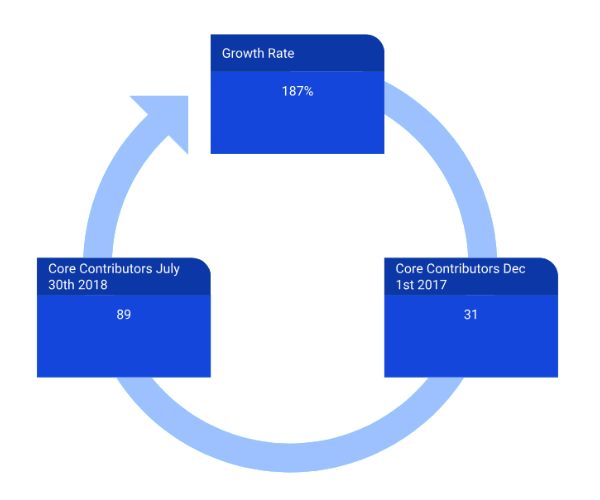Intro
Status went through massive growth since last December:

(Big ![]() to our Amazing & Tireless Talent Team!)
to our Amazing & Tireless Talent Team!)
Inevitably, the growth of our population brings with it some challenges. How do we support the team the best way we can, without falling into the traditionally corporate practices which we learned previously? How do we make sure that we stay true to our core principles?
This post is the first of several you’ll see coming up, aiming to both make the challenges and the thinking process transparent, as well as giving everyone who wants an opportunity to contribute.
People Ops’s function is to provide support: the right platform and tools, the coaching and advice - but we’re determined to avoid traditionally top-down decision making - and we encourage you all to bring up the areas where we’re not being true to that. We want to work with you and make sure you have all you need to be happy and proud of the work you do every day.
We will list some ideas. Feel free to add to this list, edit, disagree and propose others. We estimate to have enough capacity to cover for everything that we’re suggesting, but welcome contributions, big and small, from anyone who wants and can.
Challenge #1: Do we need ‘leads’, or can we do away with the entire concept?
Currently we have a structure where a few people leads throughout the organization take on the function of mentoring and coordinating others. The function isn’t clearly defined, and has created much frustration - also ideological - in the past several months. So we took a step back and asked ourselves:
What functions is a lead generally responsible for?
Financial
Coaching (feedback, improving performance, personal development, escalations)
Technical or role-related Leadership
Providing Feedback
Hiring
Do we really need managers for that? How else can we offer the important parts, and scrap what we don’t identify with?
We came up with several ideas for kicking off more decentralized practices.
Financial
- Make Expense Reports transparent. We don’t think anyone needs a manager to approve or not their expenses. We haven’t seen anyone trying to game the system. If we make expense reports open, it serves the double purpose of showing what an acceptable range for expenses is, as well as self-regulating system (i.e: peers can see what each team does, and being frowned upon by a peer is more effective than being
deniedby a perceived higher authority) - Make our burn rate visible. Everyone is responsible for the Continuance of Status.
- Implement Resourcefulness rewards (i.e: for finding best value accommodation, etc)
- Set per person event budget guidelines - to ease sanity checking for
what’s acceptable. - Set per person number of events per year
- Could be included in a L&D budget
- For event budgets, reports back to the community about the outcome would be useful to see the impact of the event
Coaching
- Career navigation, communication style, escalation.
- Share on Discuss, see if there are people who are willing to provide coaching
- Or potentially hire an external coaching agency
- Implement cohort based coaching for remote communication, navigate the organization, etc
- Provide better new hire guides
Technical or role-related leadership
- At this time, there should be enough points of contact to be technical ownership
- Soft navigation of the people network
Providing feedback
- Treat it as performance-related coaching
- Collect quantitative and qualitative data (more in depth than trial forms - ask peers for feedback as a conversation), consolidate and share as a 1:1 with core contributor, touching on what’s good, what needs to be better, listen to what is challenging for them, support designing development plans, etc)
- People Ops can pilot this ^ function
Hiring
- Create a “bottom-up” process for defining headcount growth that allows the collective organisation to prioritise (by voting) on the most urgent hiring needs.
- Allow for decentralization of hiring decisions by training everyone on interviewing & assessment - to ensure that we have consensus on what the “hiring bar” is.
- Create salary structures and norms to remove traditional hiring manager input in salary discussions.
Our question to you
Before we start making changes that nobody asked for, we’d like for everyone to comment here and let us know:
→ Are we on the right track, or should we just keep things as they are today?
→ Does anyone have better ideas, or prior experience with similar matters and wants to lend a hand?
→ Do you know of others that are facing the same challenges in the Ethereum community - and would you be able to get us in touch with them?